- Home
- Sharyn McCrumb
Lovely In Her Bones Page 14
Lovely In Her Bones Read online
Page 14
The FBI man smiled. “Maybe they made their killing anyway.”
“Huh? Oh, I see. A real killing, you mean. Then, on a personal level, this fellow seems to have been having an affair with one of his assistants.”
“Which one?”
“The girl. Her name is Mary Clare Gitlin. She was present at the time of the murder.”
“Here, you mean?”
Pilot shrugged. “Claims she was out walking in the woods. The wife was here, too. And the deceased further gummed up the works by having a fight with one of the male students over some bones in a museum.”
“Don’t forget the Cullowhees,” Hamp reminded him.
“The Indians? I thought he was helping them. Why should they kill him?”
“Because they’re Cullowhees,” said Pilot with a tight smile. “You’re not from around here, are you?”
Garrett sighed. “Everybody says that. And no, I’m not. It’s FBI policy not to assign anyone to his own hometown.”
“Too bad. Sometimes it helps to know the background things,” said Pilot. “Take the Cullowhees, for instance. Those folks are so mean they must’ve been weaned on snake venom. Ain’t a man in the valley that hasn’t seen the inside of our jail two or three times. Summer’s the worst. They get so likkered up they’d stab their own mothers.”
“Tell him about the parade that time,” Hamp prompted.
“That was a few years back, but I don’t reckon folks’ll ever forget it. Bunch of Cullowhees got piss-eyed drunk at a poker game up here and killed some joker they claimed was cheating. He was a white man, too. Lord knows how he got in the game in the first place.”
“Likely they figured to take his money,” said Hamp.
“Yeah. Well, they stabbed him in the belly, and went on with the game while he bled to death. And then they strung him up in chains behind a pickup truck and drug him down the highway to Laurel Cove.”
“Right down Main Street,” said Hamp. “And there was about ten of them a-sitting in the back of that pickup, waving like it was the Easter parade.”
“I heard it was four,” frowned Pilot.
“Well, whatever,” said Garrett quickly. “I guess those people aren’t around any more after that.”
Hamp laughed. “You’d be wrong, then. They got the driver of the truck by his license number, but he claimed not to remember who the others were. Never did charge anybody with the murder.”
The agent shook his head. “Okay,” he said at last. “Who do you think did it?”
Pilot hesitated. “Well… seeing as how it happened in Sarvice Valley, I’d have said the Cullowhees right off, but it’s a little too neat to be them.”
Hamp nodded. “You expect them to take somebody out in a brawl, not sneak up behind ’em like that. And they’d probably mess him up more, too.”
“Who did you say these people are?”
They shrugged. “Nobody knows,” said Pilot. “People say they’re part Portuguese or African or Inca. I’ve heard they’re descendants of the Lost Colony.”
“Nobody knows who they’re related to,” said Hamp. “But the devil himself is related to them.”
Milo slid the replacement disk into the computer and prepared to add the Cullowhee data to the existing file of Indian data. Since there were only twenty-five skulls in the present sample, he decided to record each separate measurement as well as the final number. It might be useful for comparison later. Elizabeth had made it easy for him by labeling each set of measurements and putting them in groups according to which tool was used to take the measure.
He would enter all his figures, calculate a standard deviation and a range of variation in millimeters. When all the data were entered on the disk, he would call up the university computer to compare his data with the existing discriminate function charts. About an hour’s work, Milo decided. Maybe more if he were especially careful with his numbers and decimal points. He might as well take his time, since the skulls were in the sheriff’s office labeled as evidence. He hoped they’d be back by the next day. If not, he and Elizabeth would begin to measure other bones that might be helpful in the identification process: humerus bones and femurs. If they suspected that one of the bodies belonged to the sheriff’s nephew or some other non-Cullowhee, they could have fluorine tests run on it. No point in thinking about that until he got the skulls back.
Milo sprawled back in his chair, punching in numbers with his two index fingers. Since the process required a minimum of thought, he allowed his mind to sort the events of the past few days, looking for some detail he might have missed before. What about Victor? Milo had written him off as a pudgy fool impersonating an intellectual, but he had been genuinely angry about that scene with Alex. Of course he minded being humiliated; he told lies to make himself seem more important. But surely people do not kill for so slight an insult. Yes, they do, he thought, but he hoped that had not been the case. To lose Alex over something so trivial would be heartbreaking.
After nearly two hours of steady work, Milo finished updating the Indian file. Remembering the break-in, he inserted a blank disk and made a backup copy to take back to the site. No one would threaten the project again if he could help it. When the copy had been safely tucked away, Milo checked the time and decided that he could still compare his lists to the university’s data. They weren’t expecting him at the site until dinner time; maybe not even then. He hadn’t eaten much in the past few days.
Milo set the telephone headset into the plastic cradle and called up the campus system. “Request,” said the screen in glowing green letters.
“Archaeological File #307-Lerche,” Milo typed.
“Enter user I.D.”
Milo tapped out, “D-i-g-g-e-r.” The word appeared before him correctly spelled.
The machine paused as if digesting this tidbit. A moment later, it replied: “Enter password.”
“Carter,” Milo said aloud, suiting his action to the word. They had arranged the password between them. “Digger” symbolizing archaeology, and then “Carter” in honor of the man who discovered the tomb of Tutankhamen. The password would not appear on the screen; that was a standard safety precaution.
For a moment the screen stayed blank, presumably while the university computer contemplated Howard Carter. Then it spat out: “Access denied. Password invalid.”
“I hit the wrong damn key,” muttered Milo, typing in “Carter” with painstaking slowness.
This time the computer was positive. It shot back: “Access denied. Password invalid.”
Milo began to wonder if the old King Tut curse was still in effect. Why the hell was he getting the run-around? He typed in “Howard Carter,” just to be thorough. The machine wasn’t having any. “Access denied. Password invalid.”
Milo snatched the telephone receiver from its cradle and called the university. All university prefix numbers were the same, and he had called the computer terminal often enough to remember the four-digit extension number. He supposed that the system was down, but he was going to yell at somebody about it.
“Computer center,” said a bored voice in a noisy room.
“Yeah. This is Milo Gordon, Dr. Lerche’s assistant. Let me speak to Jamie.”
“Jamie went home early today, man. He was up till all hours last night fixing the bugs in a program. Can I help?”
“Is the computer down?”
“Nope. It’s doing fine. How about yourself?”
“I need to call up some data from the mainframe, and your damned jukebox keeps telling me access denied.”
“That’s funny,” mused the voice. “Does it say why?”
“Says invalid password, but I used the same one we always had.”
There was a brief pause. “Hold on a second.” Milo heard the phone being put down. Idly, he wondered whether some hacker in the C.S. department had rigged the computer to refuse all passwords. Could somebody do that?
“Hello, Milo. Are you sure you’re using the right password?”
“Of course,” snapped Milo. “I’ve used it a hundred times. And I tried more than once today, so don’t try to tell me I made a typing error.”
“No, I wasn’t thinking of that. Tell me, when was the last time that you used that password?”
“Well, I haven’t tried to call up the university system since before Alex went back to-” An awful possibility suddenly occurred to him. “Has Alex been in lately?”
“Yeah. Earlier in the week. He was talking to Jamie about some trouble you guys had up there with vandalism. I was sorry to hear it. You got it fixed?”
“Uh-huh. Listen, did Alex change the password?”
“I don’t know. He might have. Can’t you ask him?”
Milo didn’t want to go into it with this guy on the phone whose name he couldn’t remember. “No. I’m here alone. Can you give me the new password?” He should have realized that Alex would have changed the password. It was the most logical thing he could have done after the break-in.
“Gee, I’m sorry, Milo. I don’t have access to it.” The voice was pleasantly neutral, unaware of the news about Alex. “But if you’ll call back tomorrow, Jamie can get it for you.”
“Yeah, sure. Maybe I’ll try a few guesses meanwhile.”
“Well, good luck.”
Milo hung up, resisting the urge to slam the telephone into its cradle. Another stumbling block. What would Alex choose for a password? He called the system again.
“Request.”
“Archaeological File #307-Lerche.”
“Enter user I.D.”
“Digger.”
“Enter password.”
It wasn’t Howard Carter. Maybe another archaeologist. “Schliemann,” Milo typed.
“Access denied. Password invalid.”
He repeated the process with Sir Arthur Evans, several variations of Teilhard de Chardin, and finally, in utter desperation, Indiana Jones, but the computer would have none of it. Access was politely, but firmly, denied.
Milo gave up. He could settle this tomorrow. At worst, this was a minor inconvenience to which he was overreacting, but his anger wouldn’t settle. He typed: “You are not going to stop me from finishing this project, damn it!” and flipped off the machine before it could register another coldly mindless reply.
CHAPTER TWELVE
IT WAS GOING to be another hot day. The sky was blazing blue by eight o’clock, not a breath of air stirring. The parched clay in the clearing was dead land, like a scar surrounded by the living forest. Elizabeth and Jake sat on a fallen log at the edge of the clearing, less than enthusiastic about the day’s work ahead.
“This place is going to be an oven,” said Elizabeth, tossing a pebble past her sneakered foot. “Can’t we pack it in?”
“Hey,” Jake protested. “This is my first day as site manager and already half my crew is mutinying.”
“Make it unanimous,” said Victor, flopping down beside him. “I just filled up the water jug, but don’t expect it to last past nine o’clock.”
“It’ll probably evaporate from the heat,” said Elizabeth. “What if we pass out from sunstroke?”
“Oh, come on! We’re in the mountains! I’ll bet it isn’t even ninety. You’re feeling the humidity, that’s all. Anyway, we said we were going to finish this project, remember?”
“But the sheriff’s department took my skulls!” said Elizabeth. “What am I supposed to do?”
“I’ll assign you to something else. Don’t worry, there’s plenty of work to be done-especially if the day people don’t show up.”
Victor took a swig from the water jug. “Mary Clare’s gone, Milo’s back in a nice air-conditioned motel room, and we’re stuck out here-”
“Like birds in the wilderness,” Elizabeth nodded.
“Look,” said Jake in tones of strained patience. “If you want to go back to the church, fine. But I’m going to stay up here and work, particularly since I think this site ought to be guarded. Now, if you want to risk being down there alone, go ahead.”
“I’ll stay,” said Elizabeth in a small voice.
“I suppose somebody has to keep an eye on things here,” said Victor grudgingly. “But if I get sun poisoning…”
“We’ll just add you to the sample,” smiled Jake. “You did say you were part Indian, didn’t you?”
They worked in silence for most of the next hour, troweling, measuring, and marking various points about the site. Elizabeth stopped periodically to apply more baby oil to her arms and face, saying that she had no desire to look like a radish in the interests of science. A little after nine, when the sun had sharpened the angle of its rays on the clearing, they heard voices in the woods. Elizabeth looked questioningly at Jake, but he motioned for her to keep working. A moment later he heard the rustle of underbrush near the tent, and Comfrey Stecoah emerged, holding a hunting rifle.
“Y’all just go on with what you were doing,” he said softly, fading back into the bush.
Elizabeth went on tying string to a wooden stake in what seemed to her like slow motion, as the indistinguishable babble of voices grew louder. Suddenly the words became distinct, and she recognized one of the speakers. “Jake!” she called out loudly for Comfrey’s benefit. “It’s the day workers! And we’re very glad to see them, aren’t we?”
“Yes!” Jake called back. “They-are-our-friends.” He glanced over his shoulder to see if the message had been received.
Five diggers from the local archaeological group came straggling in from the trail. Jake and Elizabeth greeted them effusively, casting anxious glances back toward the underbrush. Victor unscrewed the water jug and peered into it, frowning.
As soon as the workers had been settled into their usual tasks, Jake excused himself and headed for the bush. “What are you doing here?” he hissed.
Comfrey Stecoah emerged from behind a tree to the right of him. “I’m over here,” he said.
“Yeah-with a gun. Why?”
“Why, I’m just looking out for you, Little Beaver,” said Comfrey with an easy smile.
Jake scowled. “Look, Mr. Stecoah, I think that gun could cause more problems than it solves. I think we’re safe up here in broad daylight.”
“Do you, now?” Comfrey rubbed his finger speculatively along the line of his jaw. “Seems to me like I snuck up on y’all with a loaded rifle. If my intentions had been evil, I reckon I could’a blowed you all to kingdom come, with nobody being the wiser.”
Jake had to admit he had a point. The killer was still loose in the woods, presumably. What could it hurt to have some volunteer protection? The sheriff’s department certainly hadn’t offered any. “Okay,” he said. “I guess it would be okay for you to stick around.” He eyed the rifle nervously. “Just don’t wave that thing around. You’ll make us feel like a chain gang.”
Comfrey nodded. “I don’t want to scare you folks, but somebody has to protect my people’s stake in this land. Somebody wants us to lose this land, and he won’t stop at killing just one of you. Not for the money this land is worth.”
“Well… why don’t you come out there and sit down?”
“I don’t want to be a target, boy,” Comfrey said in a pitying voice. “I’m your guard.” He looked serious. “I wanted to tell you’uns how sorry I am that the doctor got killed. He was a good man, and he was trying to help us.”
“Yeah,” said Jake softly. “He was okay.”
“I don’t reckon he’d want any harm to come to the rest of you’uns, so you go on back out there, and I’ll see that it don’t.”
Jake blinked. “Okay. Just be careful with that thing!”
Comfrey smiled. “I ain’t never killed anything by accident.”
Victor troweled away, careful not to expose his upturned buttocks to the “loaded bush.” He was sweating profusely. How long had it been since his last trip to the water jug? Last time he had drawn some meaningful looks from the trenches, and he was sure that if he approached the water jug again, something causti
c would be said. Naturally, no one understood his delicate metabolism, or the nature of his sensitive skin. He oughtn’t to be out in the hot sun at all really, he told himself. Victor had long been convinced that discomfort was a bona fide illness. Unfortunately, most people did not subscribe to this theory, so for their benefit, he usually attributed his indisposition to something more acceptable, such as a migraine. It was nearly hot enough to warrant one, but Victor was determined to stick it out. He saw himself as second-in-command at the site now, and the increased feeling of self-importance compensated for the discomfort of the work. Perhaps after the next development (he allowed himself to fantasize Jake’s arrest and departure in leg-irons) he might become site manager himself.
Victor began to plan a letter to his parents informing them of his new, exalted position. He considered himself the intellectual hope of his hopelessly bourgeois family. His mother’s emotional life centered around the characters on the one-o’clock soap opera, and his father’s imagination was limited to believing that the Reds would someday win the world series. Victor considered it his duty to shock them with bizarre opinions whether he believed them or not. By the time he had finished seventh grade, his parents had decided that he was a genius. They were now waiting, a little nervously, to see what he would make of himself. The archaeological dig was a perfect example of something Victor would do for a summer, instead of going home and getting a job to earn tuition money. He had announced his plans by saying that he would spend the summer robbing graves. Victor smiled, thinking of his parents’ reaction to the news of his promotion: he doubted if they would know what he was talking about.
“We’re out of water!” called one of the day crew.
“Well, go and get some,” someone shot back.
“Hey, I didn’t even get any yet!” the digger protested, upturning the empty jug. “I’d probably drop in my tracks.”
“I’ll go,” Victor heard himself saying. His reverie about becoming site manager had put him in a good mood, and besides, if he went back to the church he could drink all the water he wanted before refilling the jug. The walk in the woods would be cooler, too, than grubbing in the hot sun in the clearing. “You go on back to what you were doing, and I’ll bring the water. No trouble.” He managed to sound as if he were making a gallant sacrifice for the welfare of his troops.

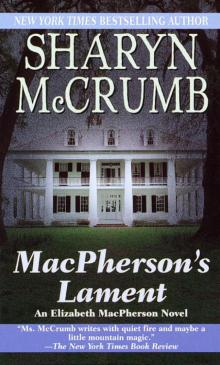 Elizabeth MacPherson 07 - MacPherson’s Lament
Elizabeth MacPherson 07 - MacPherson’s Lament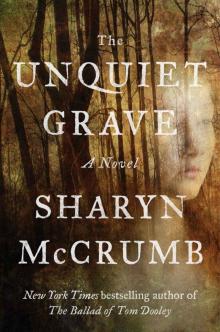 The Unquiet Grave: A Novel
The Unquiet Grave: A Novel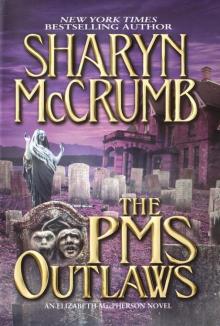 The PMS Outlaws: An Elizabeth MacPherson Novel
The PMS Outlaws: An Elizabeth MacPherson Novel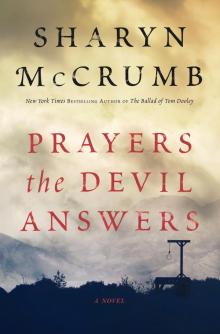 Prayers the Devil Answers
Prayers the Devil Answers Paying the Piper
Paying the Piper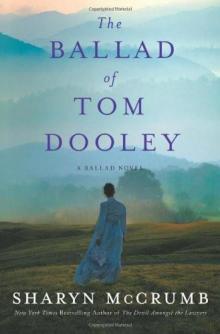 The Ballad of Tom Dooley: A Ballad Novel
The Ballad of Tom Dooley: A Ballad Novel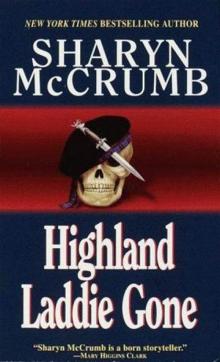 Highland Laddie Gone
Highland Laddie Gone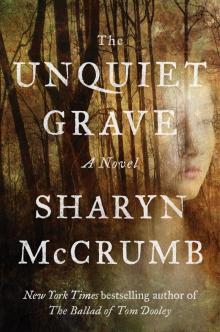 The Unquiet Grave
The Unquiet Grave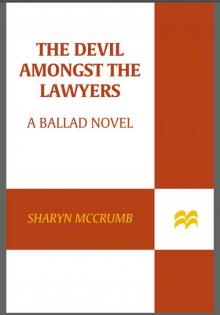 The Devil Amongst the Lawyers
The Devil Amongst the Lawyers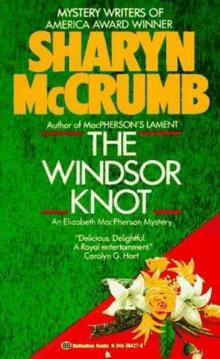 The Windsor Knot
The Windsor Knot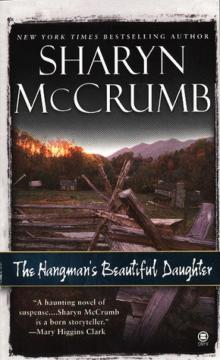 The Hangman's Beautiful Daughter
The Hangman's Beautiful Daughter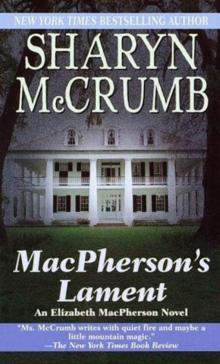 MacPherson's Lament
MacPherson's Lament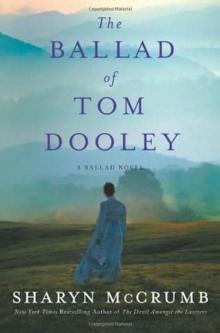 The Ballad of Tom Dooley
The Ballad of Tom Dooley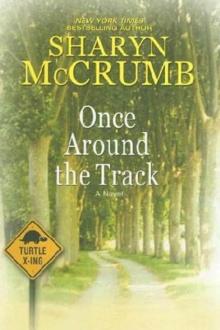 Once Around the Track
Once Around the Track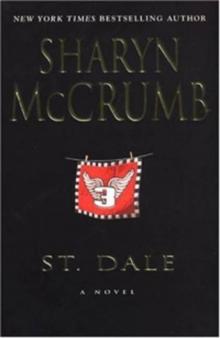 St. Dale
St. Dale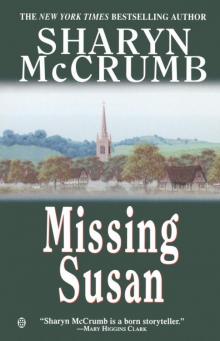 Elizabeth MacPherson 06 - Missing Susan
Elizabeth MacPherson 06 - Missing Susan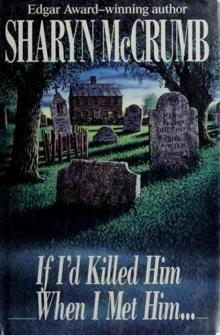 If I'd Killed Him When I Met Him…
If I'd Killed Him When I Met Him…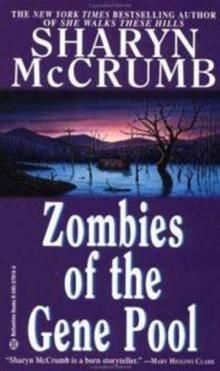 Zombies of the Gene Pool
Zombies of the Gene Pool Bimbos of the Death Sun
Bimbos of the Death Sun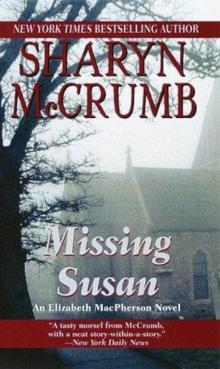 Missing Susan
Missing Susan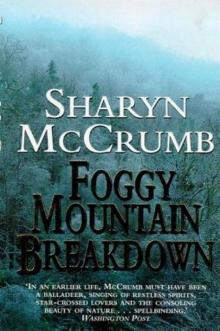 Foggy Mountain Breakdown and Other Stories
Foggy Mountain Breakdown and Other Stories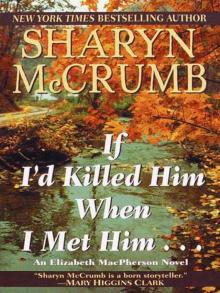 If I'd Killed Him When I Met Him
If I'd Killed Him When I Met Him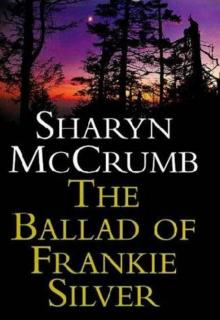 The Ballad of Frankie Silver
The Ballad of Frankie Silver Lovely In Her Bones
Lovely In Her Bones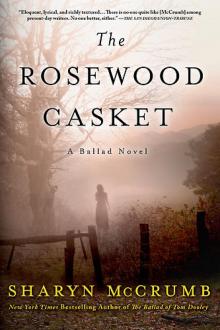 The Rosewood Casket
The Rosewood Casket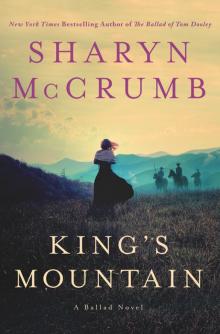 King's Mountain
King's Mountain